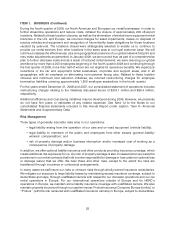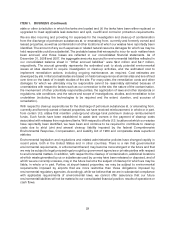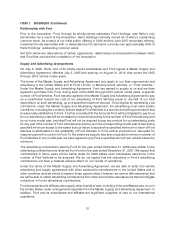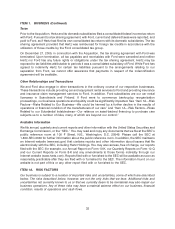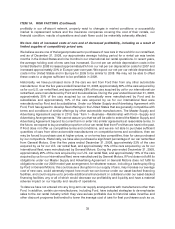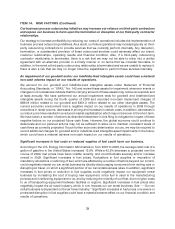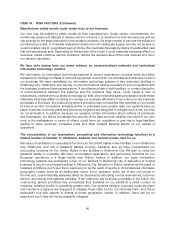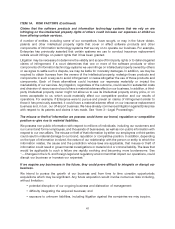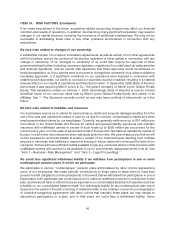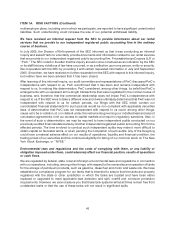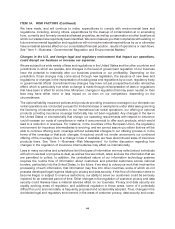Hertz 2008 Annual Report Download - page 55
Download and view the complete annual report
Please find page 55 of the 2008 Hertz annual report below. You can navigate through the pages in the report by either clicking on the pages listed below, or by using the keyword search tool below to find specific information within the annual report.ITEM 1A. RISK FACTORS (Continued)
profitably in our off-airport network, properly react to changes in market conditions or successfully
market to replacement renters and the insurance companies covering the cost of their rentals, our
financial condition, results of operations and cash flows could be materially adversely affected.
We face risks of increased costs of cars and of decreased profitability, including as a result of
limited supplies of competitively priced cars.
We believe we are one of the largest private sector purchasers of new cars in the world for our rental fleet,
and as of December 31, 2008, our approximate average holding period for a rental car was twelve
months in the United States and nine months in our international car rental operations. In recent years,
the average holding cost of new cars has increased. Our net per car vehicle depreciation costs in the
United States for 2008 increased approximately 6% from our net per car depreciation costs for 2007 and
increased approximately 20% in Europe year-over-year. We expect our net per car vehicle depreciation
costs in the United States and in Europe for 2009 to be similar to 2008. We may not be able to offset
these costs to a degree sufficient to be profitable in 2009.
Historically, we have purchased more of the cars we rent from Ford than from any other automobile
manufacturer. Over the five years ended December 31, 2008, approximately 36% of the cars acquired by
us for our U.S. car rental fleet, and approximately 28% of the cars acquired by us for our international car
rental fleet, were manufactured by Ford and its subsidiaries. During the year ended December 31, 2008,
approximately 30% of the cars acquired by us domestically were manufactured by Ford and its
subsidiaries and approximately 19% of the cars acquired by us for our international fleet were
manufactured by Ford and its subsidiaries. Under our Master Supply and Advertising Agreement with
Ford, Ford has agreed to develop fleet offerings in the United States that are generally competitive with
terms and conditions of similar offerings by other automobile manufacturers. The Master Supply and
Advertising Agreement expires in 2010. See ‘‘Item 1—Business—Relationship with Ford—Supply and
Advertising Arrangements.’’ We cannot assure you that we will be able to extend the Master Supply and
Advertising Agreement beyond its current term or enter into similar agreements at reasonable terms. In
the future, we expect to buy a smaller proportion of our car rental fleet from Ford than we have in the past.
If Ford does not offer us competitive terms and conditions, and we are not able to purchase sufficient
quantities of cars from other automobile manufacturers on competitive terms and conditions, then we
may be forced to purchase cars at higher prices, or on terms less competitive, than for cars purchased
by our competitors. Historically, we have also purchased a significant percentage of our car rental fleet
from General Motors. Over the five years ended December 31, 2008, approximately 23% of the cars
acquired by us for our U.S. car rental fleet, and approximately 15% of the cars acquired by us for our
international fleet, were manufactured by General Motors. During the year ended December 31, 2008,
approximately 25% of the cars acquired by our U.S. car rental fleet, and approximately 18% of the cars
acquired by us for our international fleet, were manufactured by General Motors. If Ford does not fulfill its
obligations under our Master Supply and Advertising Agreement or General Motors does not fulfill its
obligations under our 2009 model year arrangement, for whatever reason, including a bankruptcy filing
by Ford or General Motors, this could cause a disruption in our supply of cars, may increase our average
cost of new cars, could adversely impact how much we can borrow under our asset-backed financing
facilities, and could require us to provide additional enhancement or collateral under our asset-backed
financing facilities, any or all of which would decrease our profitability and liquidity and have a material
adverse impact on our liquidity and results of operations.
To date we have not entered into any long-term car supply arrangements with manufacturers other than
Ford. In addition, certain car manufacturers, including Ford, have adopted strategies to de-emphasize
sales to the car rental industry which they view as less profitable due to historical sales incentive and
other discount programs that tended to lower the average cost of cars for fleet purchasers such as us.
35


